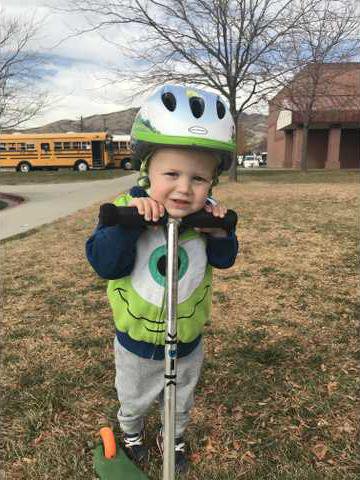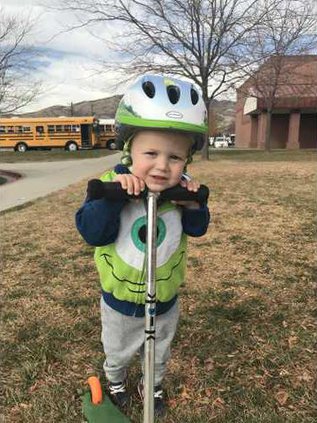A few months before giving birth to my first son, Boston, I called my grandma in tears. I am so bored, I said, staring outside at the bleak winter day from my tiny third-story apartment. I keep wondering if I should be doing something else to try and further my career in music, and why it didnt work out the way I had hoped for.
My amazing grandma is someone I always turn to for advice and a pick-me-up. She is always on my side 100 percent no matter what. She listened to my frustrations and then said, Carmen, you have to stop thinking that you have to prove something. You have had amazing opportunities. You have been able to follow your dreams and have a music career. In a few months, you will have a little buddy who will be by your side every minute of every day. And you wont be bored anymore. But listen to me, you have done enough. Now focus your energies on your family.
Those words have carried me through some of the most difficult challenges in motherhood. When I am looking like Im one missed bath away from resembling a cavewoman and wondering where my brain went (I tried to put my phone in the fridge the other day) or when my 2-year-old is going on two hours of screaming because I wiped his nose and he wants me to put my boogers back (true story) or when I look around the house and think, What the heck did I do today? I think about those words: You have done enough.
Author and psychoanalyst Erica Komisar recently penned a book titled, Being There: Why Prioritizing Motherhood in the First Three Years Matters that has received massive criticism. After several decades of research and studies, Komisar suggests that mothers play a critical role in their childs early development, especially during the first three years of life and that the absence of a mother can result in behavioral disorders in the child.
What I was seeing, says Komisar, was an increase in children being diagnosed with ADHD and an increase in aggression in children, especially in boys, and an increase in depression in little girls. She saw that the absence of mothers in childrens daily lives was one of the triggers for these mental disorders.
In my daydreams, while Im elbow deep in dirty dishwater, I sometimes wonder what would happen if I decided to leave my homemaking life behind and go on a big nationwide tour again. How much would my kids really miss me?
According to Komisars research, a lot. Mothers are biologically necessary for babies. (They) are much more neurologically fragile than weve ever understood, she said. According to an article published in The Wall Street Journal titled, The Politicization of Motherhood, Komisar "cites the view of one neuroscientist, Nim Tottenham of Columbia University, that babies are born without a central nervous system and mothers are the central nervous system to babies, especially for the first nine months after birth.
What does that mean? Every time a mother comforts a baby in distress, shes actually regulating that babys emotions from the outside in. After three years, the baby internalizes that ability to regulate their emotions, but not until then. For that reason, mothers need to be there as much as possible, both physically and emotionally, for children in the first 1,000 days.
Its no wonder we often feel guilty leaving our babies for one reason or another, but guilt may not be a bad thing, according to Komisar.
My best patient is a patient who comes to me feeling guilty, says Komisar. Women who feel guilty its a signal feeling, that somethings wrong, that theyre in conflict. If they go talk to a therapist or deal with the conflict head-on, they often make different choices and better choices.
Sometimes women dont have a choice, and for all the mothers out there who are working out of necessity, I want to say that I think you are amazing and you are also doing enough.
But for those of us who are able to stay home with young kids, then that is exactly where we should be. If you are wondering whether you are enough, take it from my wise grandma: You are.
And staying home for your season doesnt mean you can never pursue interests again. You can do everything in life, Komisar encouraged women, but you cant do it all at the same time.
My amazing grandma is someone I always turn to for advice and a pick-me-up. She is always on my side 100 percent no matter what. She listened to my frustrations and then said, Carmen, you have to stop thinking that you have to prove something. You have had amazing opportunities. You have been able to follow your dreams and have a music career. In a few months, you will have a little buddy who will be by your side every minute of every day. And you wont be bored anymore. But listen to me, you have done enough. Now focus your energies on your family.
Those words have carried me through some of the most difficult challenges in motherhood. When I am looking like Im one missed bath away from resembling a cavewoman and wondering where my brain went (I tried to put my phone in the fridge the other day) or when my 2-year-old is going on two hours of screaming because I wiped his nose and he wants me to put my boogers back (true story) or when I look around the house and think, What the heck did I do today? I think about those words: You have done enough.
Author and psychoanalyst Erica Komisar recently penned a book titled, Being There: Why Prioritizing Motherhood in the First Three Years Matters that has received massive criticism. After several decades of research and studies, Komisar suggests that mothers play a critical role in their childs early development, especially during the first three years of life and that the absence of a mother can result in behavioral disorders in the child.
What I was seeing, says Komisar, was an increase in children being diagnosed with ADHD and an increase in aggression in children, especially in boys, and an increase in depression in little girls. She saw that the absence of mothers in childrens daily lives was one of the triggers for these mental disorders.
In my daydreams, while Im elbow deep in dirty dishwater, I sometimes wonder what would happen if I decided to leave my homemaking life behind and go on a big nationwide tour again. How much would my kids really miss me?
According to Komisars research, a lot. Mothers are biologically necessary for babies. (They) are much more neurologically fragile than weve ever understood, she said. According to an article published in The Wall Street Journal titled, The Politicization of Motherhood, Komisar "cites the view of one neuroscientist, Nim Tottenham of Columbia University, that babies are born without a central nervous system and mothers are the central nervous system to babies, especially for the first nine months after birth.
What does that mean? Every time a mother comforts a baby in distress, shes actually regulating that babys emotions from the outside in. After three years, the baby internalizes that ability to regulate their emotions, but not until then. For that reason, mothers need to be there as much as possible, both physically and emotionally, for children in the first 1,000 days.
Its no wonder we often feel guilty leaving our babies for one reason or another, but guilt may not be a bad thing, according to Komisar.
My best patient is a patient who comes to me feeling guilty, says Komisar. Women who feel guilty its a signal feeling, that somethings wrong, that theyre in conflict. If they go talk to a therapist or deal with the conflict head-on, they often make different choices and better choices.
Sometimes women dont have a choice, and for all the mothers out there who are working out of necessity, I want to say that I think you are amazing and you are also doing enough.
But for those of us who are able to stay home with young kids, then that is exactly where we should be. If you are wondering whether you are enough, take it from my wise grandma: You are.
And staying home for your season doesnt mean you can never pursue interests again. You can do everything in life, Komisar encouraged women, but you cant do it all at the same time.



